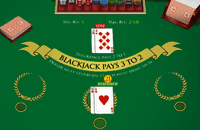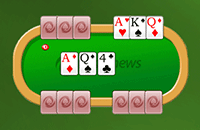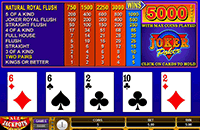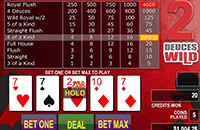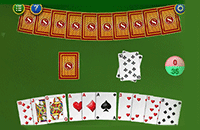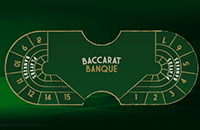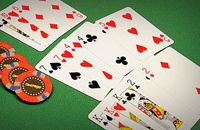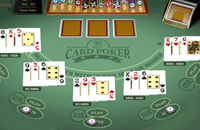Omaha Poker Rules Strategy & Tips
How to Play Omaha Poker
Omaha is a poker game using community cards, those that can be used by all players at the table along with ‘hole’ cards which are unique and secret to each player. As with all versions of poker, in Omaha, the aim is to make the best possible 5 cards by hand.
Omaha is the 2nd most popular form of poker behind Texas Hold’em and Omaha Poker rules are very similar except for one major difference. In Omaha, you receive 4 ‘hole’ cards as opposed to 2 in Texas Hold’em. It is important to remember that although you receive 4 ‘hole’ cards, you must use 2 of these 4. Whereas in Texas Hold’em you can choose whether to use 0, 1 or both of your hole cards, in Omaha you need to choose 2 of your 4 and cannot, therefore, play with all 5 community cards but need to use 2 from your hand and 3 from the board. This is a mistake many players make when playing Omaha poker.
Omaha Poker can be found on all good online poker sites although there will not be as many players or tournaments featuring Omaha as there are for Texas Hold’em.
You will find cash games though, which allow you to sit down with your own chips and walk away with your money at any time as well as some sit and go and scheduled tournaments which see all players pay a buy-in and fee to play with the same number of starting chips. The last players in the tournament win so you cannot walk away at any point with money like you can when playing cash games.
Omaha Poker Rules
One single deck of 52 cards is used to play Omaha poker. As in other types of poker, cards count at their respective values and Aces can count as either high or low.
In Omaha Poker rules for each hand, one player is chosen as the dealer and will have a ‘button’ in front of them to represent this. When playing online, the cards are automatically dealt starting with the player to the left of the dealer. This disc moves around the table after each hand in a clockwise direction.
Before cards are dealt in a hand, the player to the dealer’s left puts in a forced bet known as a ‘small blind’. In a cash game, this is the same each hand depending on the table limits, in a tournament the blinds increase at set intervals to ensure the tournament comes to a conclusion at some point. The person to the left of the small blind, so 2 to the left of the dealer, pays a big blind bet, normally double that of the small blind. As the dealer button goes round after each hand, players take it in turns to place these bets, thus making it fair whilst also ensuring there is money to be won each hand.
Once these bets are in place, 4 cards are dealt face down to each player, starting with the player on the dealers left, the small blind.
The first betting round now begins with the player to the left of the big blind. An advantage of being ‘in the blinds’ is that you are last to act in the first betting round and therefore should have a good idea of what other players at the table have.
Players need to either ‘Call’ the current bet (this means to place a bet equal to it), Raise (meaning you increase the largest bet that has previously been made by matching this bet and then adding more on top) or Fold (decide you don’t want to be in this hand and throw your cards away, giving up the chance to win the hand but not risking any chips).
Play – or action – continues around the table until every player has either Folded and left the hand or Called – or matched – the highest bet. If the action goes to the last player, the big blind, and no one has Raised, that player can Check if he wishes, this means he stays in the hand but puts no more chips in as he has effectively already placed a bet equal to the big bet before. He can Raise if he wishes though in which case anyone still in the hand will need to Call the new highest bet.
Once this betting round has been completed, the Flop is dealt. This is 3 cards that are face up in the middle of the table, all remaining players can use these cards along with 2 of their 4 hole cards.
Please remember though that you do need to use 2 cards from your 4, therefore as an example, if you have 3 Clubs in your hand and there are 2 on the board, you don’t have a flush as you can only use 2 of the 3 Clubs from your hole cards.
Once the Flop has been dealt, the 2nd betting round takes place. This is similar to the 1st betting round and starts with the player to the left of the dealer who is still in the hand. As there is no forced bet at this point, each player can Check if they don’t wish to put more chips in, however, if another player does choose to bet, all remaining players will need to Call it to stay in the hand. Once all remaining players have either Folded or Called the highest bet, the round finishes.
A 4th card is now dealt face up in the middle of the table for everyone to use, this is commonly known as the Turn. A 3rd betting round now takes place as before.
Once this has been completed, the 5th and final community card, the River, is dealt. This is the final card and now gives all players 9 cards from which to choose from. A final betting round then takes place and if there are still 2 or more players left after this round, it is time for the Showdown to determine who wins. If all players Fold in the hand, the last player in the hand wins the pot.
The remaining players need to choose which 2 hole cards to use with which 3 community cards in order to make the best 5 card hand. You don’t have to choose the 2 hole cards until this point and if you are playing online, the software will choose the best cards for you so you need to worry about that.
The player with the best 5 card hand wins the pot, if the hands are exactly the same, players with the same best hand will split the pot equally. Check out our hand rankings page here if you are unsure as to the best ones.
An example of an Omaha Poker hand is below.
This is an example of Omaha Poker. Remember that you can only use 2 of your 4 hole cards, therefore in the above example, your best option would be to use the 4 of Hearts and Ace of Diamonds along with the 8 Diamonds, 8 of Clubs and 4 of Spades from the 5 community cards.
This would give you a hand of 2 pairs, 8’s over 4’s, with an Ace kicker.
Winning hands tend to be better in Omaha than Texas Hold’em though as each player has a combination of starting hands available to them.
Omaha Strategy
We’ve aleady mentioned that in Omaha Poker rules when playing the key thing to remember is that you must use 2 of your 4 hole cards. Not 1, 3, 4 or 0, but 2.
So many people see 3 suited cards in their hand and think if the Flop contains 2 more, they have a flush. You don’t, you can only use 2 of your 4 hole cards.
If you remember this from the start, you will already find you have an advantage over some players who simply don’t understand the rules.
Another key thing to remember, especially if you play Texas Hold’em quite a lot, is that because all players have 4 hole cards instead of 2, the quality of the winning hands is likely to be much higher than that found in a game of Texas Hold’em.
There are 6 possible options of hold cards for every player in every hand compared to Texas Hold’em where you have 1. Therefore, it follows that a flush on a board that has at least 1 pair will not be as strong in Omaha due to the increased chances of a player hitting a full house or better.
So, what hands should you raise with preflop in Omaha?
For a start, it is not recommended to simply call a hand in Omaha. Raising or Folding is generally the way to go unless you are trying to trap an opponent or increasing your pot odds when you are in a big draw.
When you are acting pre-flop it is recommended to raise with a variety of different hands and to mix your play up a bit to keep other players guessing at what you have. It is a bad idea to be too predictable in all forms of poker, none more so than in Omaha. A variety of cards in your hand is also good for drawing opportunities, which is an important aspect of Omaha as well.
For example, a starting hand of AAKK with of 2 different suits is one of the best starting hands to have and the odds of getting this are around 50,000 to 1. However, this hand is just a 3 to 2 favorite pre-flop against a hand of 5678 double suited. It really is what happens after the flop that counts as there are so many more options in Omaha than in Texas Hold’em.
We would recommend raising pre-flop with any of the following (where x are any cards):
• All top 30 starting hands with at least 2 the same suit and sometimes if you are feeling it, off-suit
• All suited AKxx with at least one of the x cards 10 or higher
• All double-suited 4 in a row hand
• All double-suited connected hands with no more than a gap of one between the top 2 cards and bottom 2 cards or between the low card and 3 high cards, such as 8-9-J-Q double suited or 9-7-6-4 double suited
• All KKxx double suited
Omaha Tips
Be selective with your starting hands – The higher number of options all players have to mean the winning hand is likely to have to be much better than in Texas Hold’em, therefore avoid calling with low cards that aren’t double suited or consecutive.
Get to know the players – Whilst this is important in all forms of poker, this is especially the case in Omaha, if you can spot those players that call or raise with anything, you could well have a good advantage against them when you hit something good
Respect most big raises and bets – Again, true for all forms of poker but unless you have an exceptional hand or a lot of draws, get out if a big bet comes along
Do not overestimate your hand – The nut flush for example in Texas Hold’em would normally be an excellent hand and give you a great chance of winning, this is not the case in Omaha especially if the board has paired as winning hands are normally a lot better
Work out your outs – A hand with 8 outs in Texas Hold’em would normally be worth playing, however, due to the increased number of starting combinations in Omaha, it is possible to flop a hand with 13, 17 and 20 way Straight draws meaning it a lot less likely your hand will hold up
Do not always play unsuited Aces – AA preflop would be great in Texas Hold’em, in Omaha though if you don’t have another card of the same suit, you need to really hit one of the other 2 Aces on the Flop otherwise there is little else to improve your hand
Be cautious in multi-way pots – If more than one other player is in the hand with you, the likelihood is that you will need the ‘nuts’ – the best possible hand – to ensure you win, don’t invest too much if you don’t have a chance of getting it
Crazy Pineapple Poker
Pai Gow Poker
Poker Hand Rankings
Play Poker for Real
Poker Video Tutorials

